Introduction
Creatine is the one most popular supplement in the fitness world. It’s taken by athletes, bodybuilders and casual gym-goers to boost strength, enhance performance and speed up recovery. But despite its benefits, creatine has suffered from several myths — one of the biggest being that it can lead to kidney stones. Many wonder: can creatine cause kidney stones?
If you’ve ever been concerned about this, you are not alone. The fear of creatine damaging kidneys or causing agonizing stones in the kidney has kept many people away from taking creatine. But is there any truth to this at all?
In this article, we’ll discuss the science behind creatine and kidney health. This article explains what kidney stones are, how to identify them, and what recent research indicates regarding creatine’s effects on your kidneys. Plus, we’ll offer expert advice on how to safely use creatine.
Understanding Creatine
Before we get into kidney stones, let’s make sure we have a full understanding of what creatine actually is.
What Is Creatine?
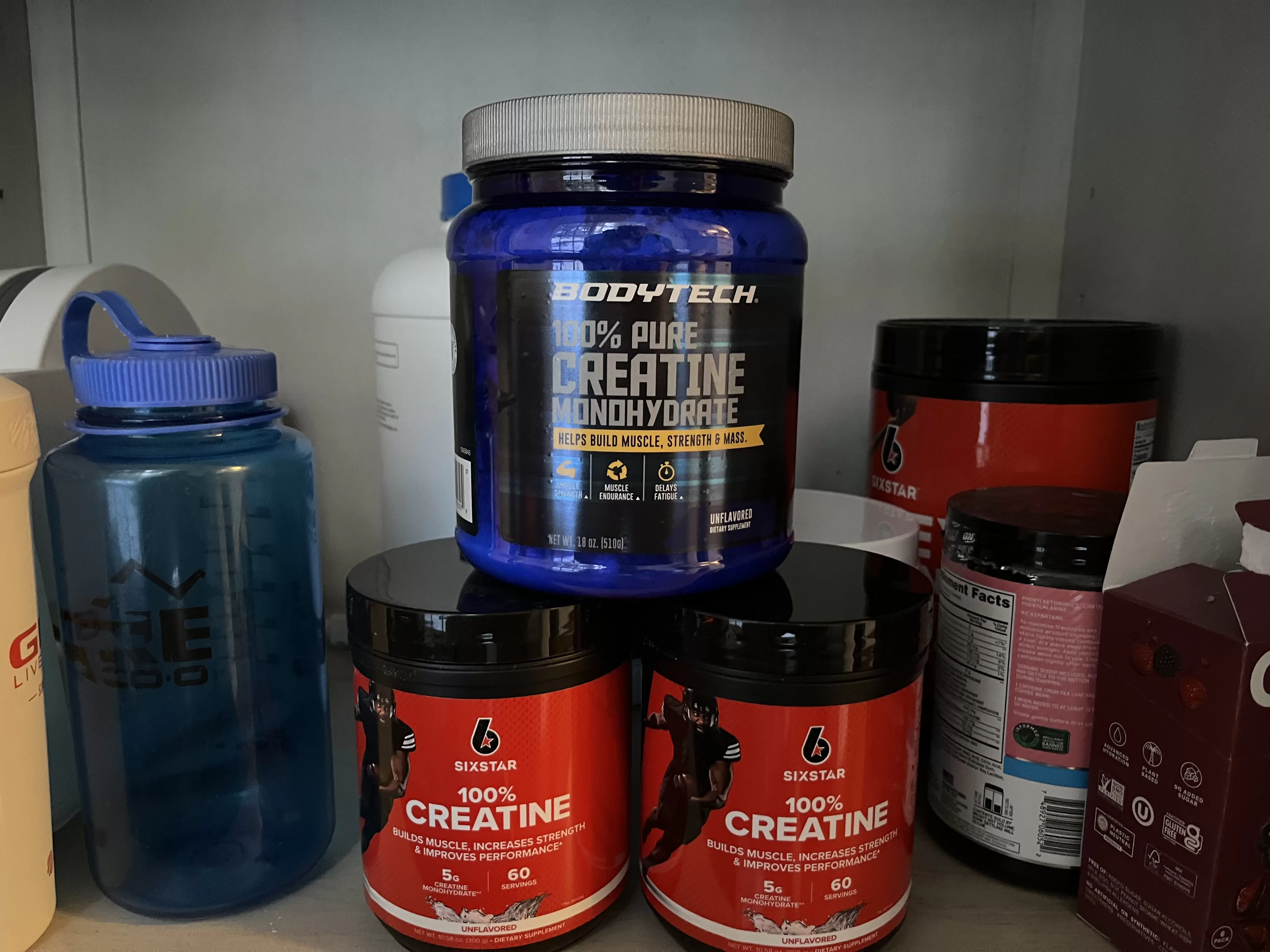
Creatine Is a naturally occurring substance that is produced mostly in your muscles and brain. Your body makes it from three amino acids — arginine, glycine and methionine.
Creatine is stored in your muscles as phosphocreatine. This stored energy serves to generate adenosine triphosphate (ATP), the primary energy source your muscles rely on for short bursts of activity, such as weightlifting and sprinting (Buford et al.).
Related article: Are Creatine Supplements Safe?
Where Do We Get Creatine From?
Wondering “how is creatine made?” Well, your body gets creatine from two sources:
- Food Sources: Creatine can be obtained from animal-based foods, especially red meat, poultry, and fish. But that’s a relatively small amount.
- Supplements: The most widely used and studied form of creatine is creatine monohydrate. It’s commonly used because it’s inexpensive, efficient, and safe.
Does Creatine Harm Your Kidneys?
Since creatine breaks down into creatinine (a waste product), some worry it could overload the kidneys. However, multiple studies have concluded that creatine does not harm kidney function in healthy individuals (Kreider et al.).
Now let’s dive a little deeper into kidney stones, and whether or not creatine contributes to their development.
What Are Kidney Stones?

Kidney stones are solid mineral deposits that forms in the kidneys to highly concentrated substances contained in certain forms of urine.
These stones may be sized from a grain of sand to the size of a golf ball and can cause intense pain in their passage through the urinary tract (Curhan et al.).
Common Causes of Kidney Stones
Several factors can increase the risk of kidney stones, including:
- Dehydration: Not drinking enough water causes your urine to be more concentrated, making it easier for stones to develop.
- Diets High in Salt and Protein: Too much sodium and animal protein raise your chances of developing stones.
- Foods High in Oxalates: Oxalate is a type of salt that can contribute to the formation of calcium oxalate stones, which is the most common type of kidney stone. Foods like spinach, beets, and nuts contain oxalates.
- Genetics: If kidney stones are in your family history, your risk is higher.
How to Tell If You Have Kidney Stones
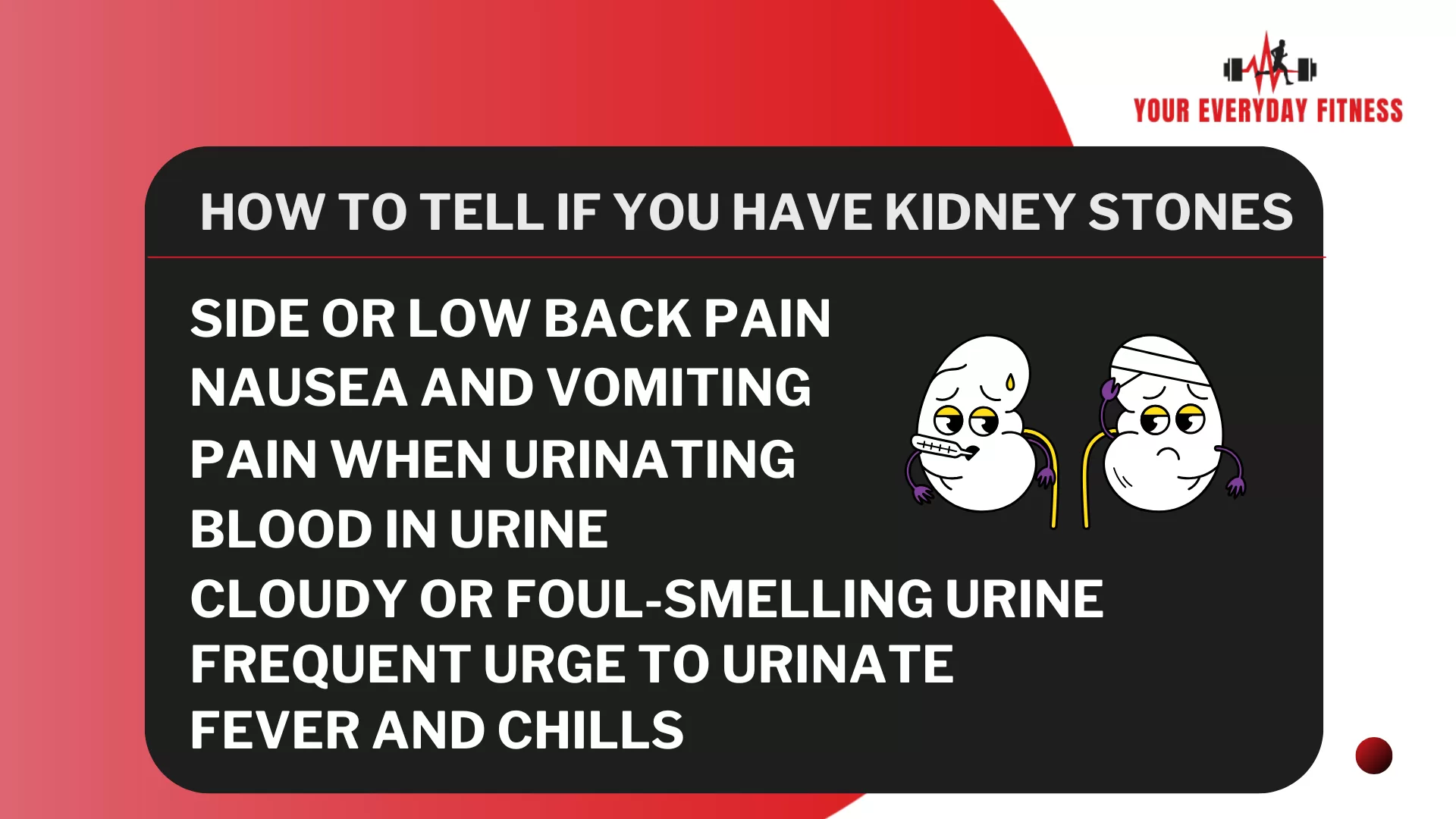
If you’ve never had kidney stones, you may not know how to recognize symptoms. These are the main things to look for.
Severe Pain in the Lower Back or Side
- The most frequent and severe symptom of kidney stones is a sharp, cramping pain in the lower back, side or abdomen.
- The pain comes and goes in waves, often growing worse as the stone moves.
Pain When Urinating
- Pain or discomfort while urinating. Often feels like a burning sensation.
- Urination can become painful if the stone gets to the bladder or urethra.
Blood in Urine (Hematuria)
- If urine looks pink, red or brown, it may mean the stone is damaging the urinary tract.
Frequent Urge to Urinate
- Increased urgency to go to the bathroom, even if there is only a little coming out.
- This occurs when the stone is obstructing urine flow.
Cloudy or Foul-Smelling Urine
- Cloudy urine can signal an infection or too much minerals.
- There can also be a strong, bad smell.
Nausea and Vomiting
- The intense pain or blockage in the urinary tract causes nausea in some people.
Fever and Chills (In Severe Cases)
- A fever may indicate a kidney infection, which requires prompt medical care.
The Link Between Creatine and Kidney Stones
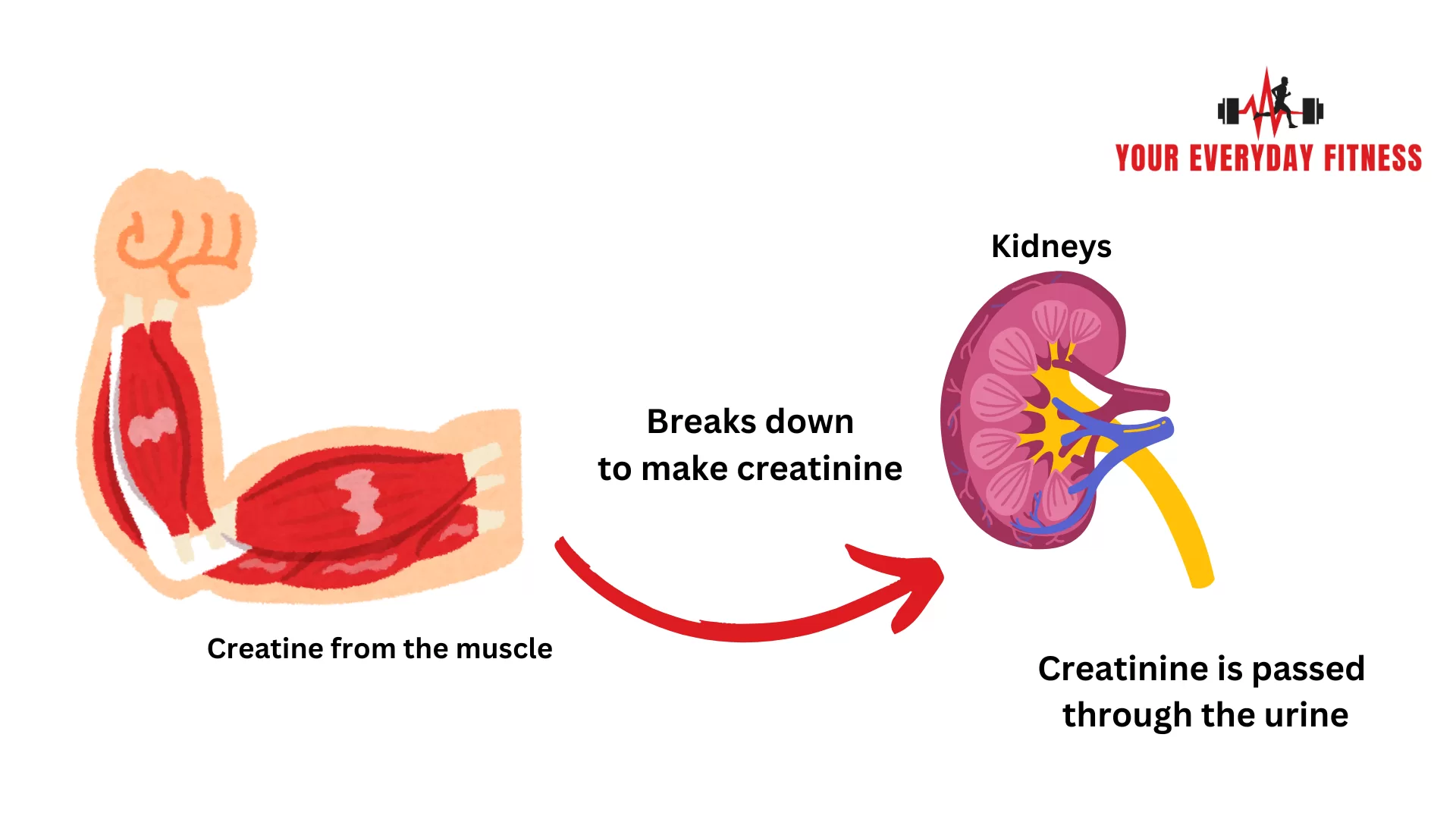
The theory that creatine leads to kidney stones is based on the idea that it overworks the kidneys, which, in turn, puts you in a dehydrated state that causes stones to form. But is there real science to prove this claim? Or is it another fitness myth?
To understand, we have to look at what creatine does in relation to kidney function, urine composition and hydration levels. More important, we’ll look at what various science-backed studies say about creatine’s long-term impacts on the kidneys.
How Do Kidney Stones Form?
Before getting into the research, let’s quickly go over how kidney stones form.
Kidney stones develop when specific minerals and salts in the urine start to crystallize and stick together to form hard deposits.
Some common types of kidney stones include:
- Calcium oxalate stones — a buildup of calcium and oxalate in urine.
- Uric acid stones – More commonly seen in individuals following high-protein diets.
- Struvite stones – Associated with urinary tract infections (UTIs).
- Cystine stones – result from a rare genetic disorder.
Dehydration (the leading cause of kidney stones) causes urine to become more concentrated, which facilitates the clumping of these compounds, leading to formation of kidney stones.
Does Creatine Increase Kidney Stone Risk?
Creatine has been associated with kidney stones because of these claims:
- It allegedly raises creatinine levels, a waste product filtered out by the kidneys.
- It can result in dehydration, a key risk factor for kidney stones.
- It is metabolized through the kidneys, so high doses could overload them.
But research does not strongly support any of these claims. So what do the scientific studies say with respect to creatine’s effect on the kidneys?
What Does the Science Say?
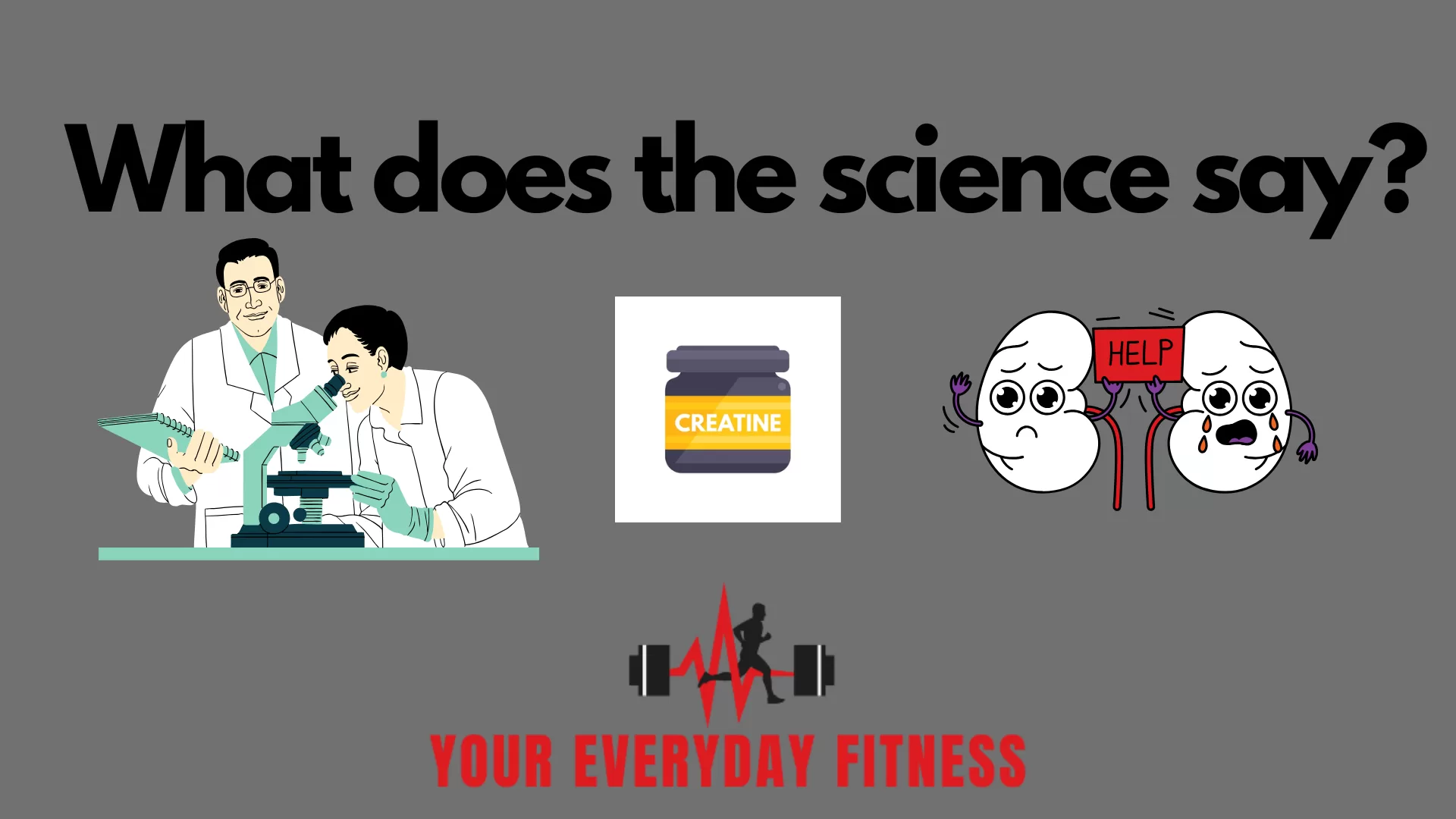
Multiple studies have explored the effect of creatine on kidney function, particularly in athletic or bodybuilder populations who take creatine regularly.
Here’s what they found:
A 2022 Study on Athletes with a History of Kidney Stones
In one study published in the Clinical Journal of Sports Medicine, researchers examined athletes who previously had kidney stones. This time, the researchers were interested in whether supplementing with creatine monohydrate would raise the risk of recurring kidney stones during a period of two months or not.
The results? They did not observe any increase in kidney stone formation. The creatine-using athletes showed no evidence of kidney damage, dehydration or increased sediment in the urine — all risk factors for stone formation (Mousavi et al.).
A 2020 Systematic Review on Kidney Function and Creatine
A meta-analysis published in 2020 that examined numerous studies relating to creatine and kidney health found that even in individuals taking large doses (20 grams per day) of creatine had no adverse effects on kidney function over time (Kreider et al.).
That means even long-term—taking creatine in massive doses for weeks or months at a time—it doesn’t cause kidney strain, rise in creatinine or form stones.
A 5-Year Longitudinal Study on High-Dose Creatine Use
Poortmans and Francaux conducted one of the largest long-term studies testing creatine effects on kidney health. Their study observed athletes on 30 grams of creatine a day for five years, six times the recommended daily dose.
At the study’s conclusion, there was no evidence of kidney dysfunction or stone formation (Poortmans and Francaux).
This matters because kidney stones take months or years to develop. If creatine were an actual risk factor, a five-year study would almost certainly have found it.
Does Creatine Cause Dehydration?
Perhaps the most popular argument against taking creatine is that it dehydrates you, and dehydration is a leading cause of kidney stones.
The belief comes from the fact that creatine pulls water into muscle cells, which some people assume decreases total body water, resulting in dehydration. However, this is a myth.
According to a 2017 study that appeared in the Journal of the International Society of Sports Nutrition (Casa et al.), creatine does not adversely affect hydration status.
Proper creatine supplementation, in fact, should improve hydration levels, since creatine pulls water into the muscle cell.
Does Creatine Increase Urinary Calcium?
Certain types of kidney stones, especially calcium oxalate stones, are associated with high urinary levels of calcium (hypercalciuria). Some are concerned that creatine may exacerbate this by raising calcium output in urine.
Research actually indicates that creatine does not significantly affect urinary calcium levels. A 2008 study in the Journal of the American Society of Nephrology found that creatine supplementation did not elevate urinary calcium concentrations or increase the risk of stone formation even among those consuming high-protein diets (Curhan et al.).
Who Should Be Cautious?
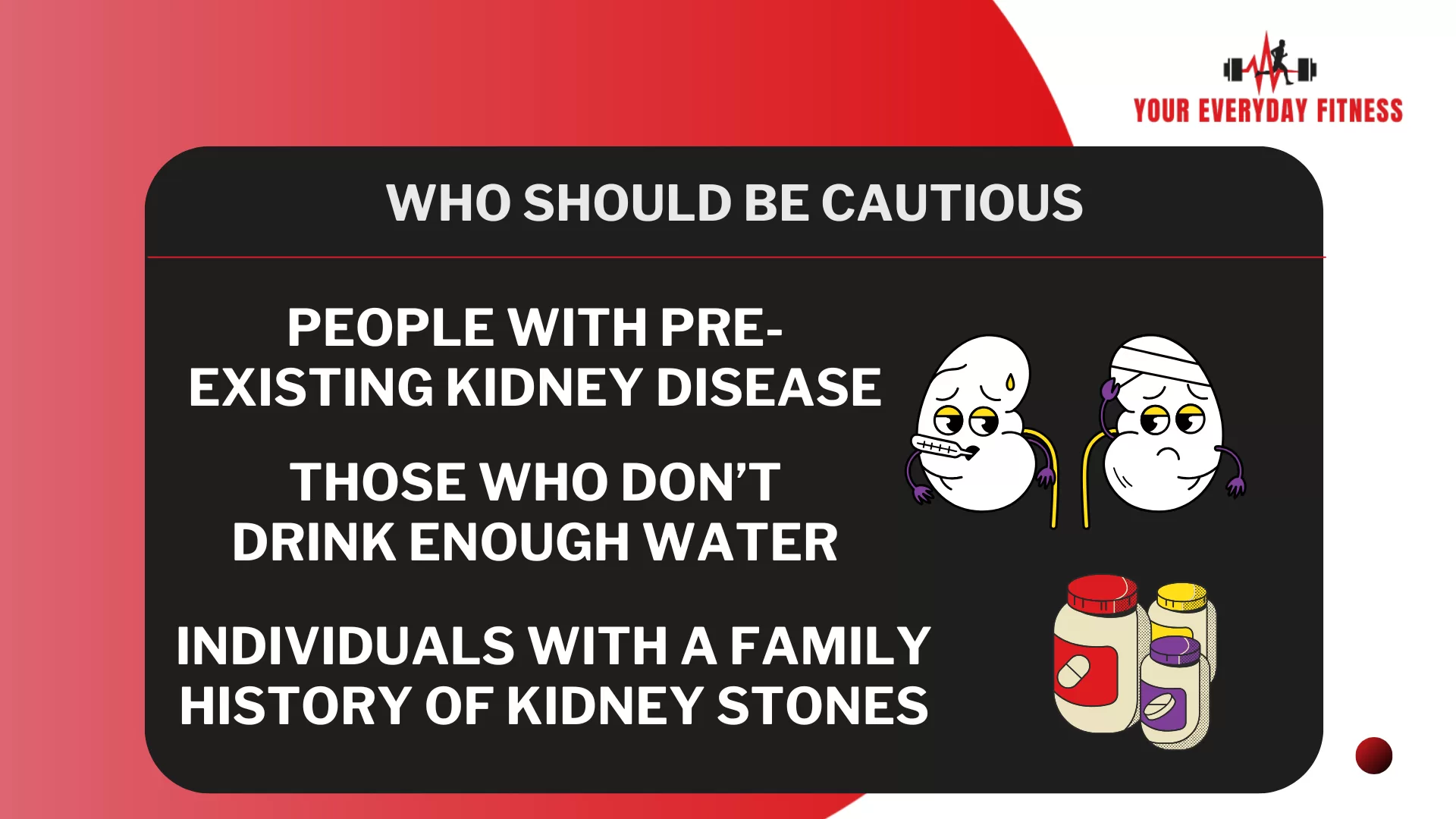
Although creatine is safe for most people, there are some individuals who should be cautious:
- People with Pre-Existing Kidney Disease – This group may be recommended against taking creatine. Always discuss with a doctor first.
- Those Who Don’t Drink Enough Water – Creatine doesn’t dehydrate per se, but lack of water could still lead to kidney stones.
- Individuals with a Family History of Kidney Stones – If kidney stones are in your family history, it’s wise to stay extra hydrated and watch what you eat.
How to Use Creatine Safely
Here’s what you need to know to use creatine safely and effectively:
- Dosage: Start with 3–5 grams per day (no loading phases needed).
- Stay Hydrated: Drink 8-12 glass water every day.
- Medical Consultation: If you have kidney issues, check with your doctor first.
Final Verdict: Can Creatine Cause Kidney Stones?
So, can creatine cause kidney stones? The evidence says NO.
There is growing information on the merits of creatine supplementation, and based on the overwhelming weight of scientific evidence, creatine will not cause kidney stones in healthy individuals.
A Summary:
- A number of prolonged studies (up to 5 years) have indicated creatine does not harm kidney function even at elevated doses nor elevate stone risk.
- Research confirms that creatine does not cause dehydration, a major factor in kidney stone formation.
- Creatine does not significantly impact urinary calcium levels, making it unlikely to play a role in the formation of calcium oxalate stones.
As long as you are healthy, well-hydrated, and use proper dosages, creatine is a safe and effective supplement, giving you muscle and performance benefits without harming your kidneys.
If you have underlying kidney conditions, it’s always best to consult with your doctor before supplementing. But for the average person, when it comes to kidney health, there’s no reason to fear creatine.
This supplement can be a game changer for performance, strength and recovery for most folks — without the risk of kidney stones!
FAQs
Creatine vs. Creatinine: what’s the difference?
Creatinine is often confused with creatine, but they are entirely different.
- Creatine is an energy booster stored in muscles and naturally found in body.
- Creatinine is a waste product that is filtered out by the kidneys.
Does creatine increase creatinine levels in blood tests?
Yes, creatine can increase creatinine levels, but this doesn’t mean kidney damage. Since creatine naturally breaks down into creatinine, blood tests may show slightly higher creatinine levels. However, this is not a sign of kidney dysfunction—it’s simply a result of creatine metabolism (Kreider et al.)
Is there a “best” type of creatine for kidney health?
Yes—Creatine monohydrate is the most researched and proven form. Avoid alternatives, like creatine ethyl ester, which have less scientific backing and may be less effective.
References
- Buford, Thomas W., et al. “International Society of Sports Nutrition position stand: creatine supplementation and exercise.” Journal of the International Society of Sports Nutrition, 2007.
- Kreider, Richard B., et al. “Creatine supplementation and health status.” Sports Medicine, 2003.
- Poortmans, Jacques R., and Marc Francaux. “Long-term creatine supplementation does not impair renal function in healthy athletes.” Medicine and Science in Sports and Exercise, 1999.
- Mousavi, Mehran, et al. “Creatine supplementation in athletes with a history of kidney stones.” Clinical Journal of Sports Medicine, 2022.
- Liao, Chun, et al. “The effects of creatine supplementation on kidney function: A systematic review.” The American Journal of Kidney Diseases, 2021.













 Ever wondered how to build arms like Arnold?
Ever wondered how to build arms like Arnold? 
 Ready to build massive legs like the legend h
Ready to build massive legs like the legend h